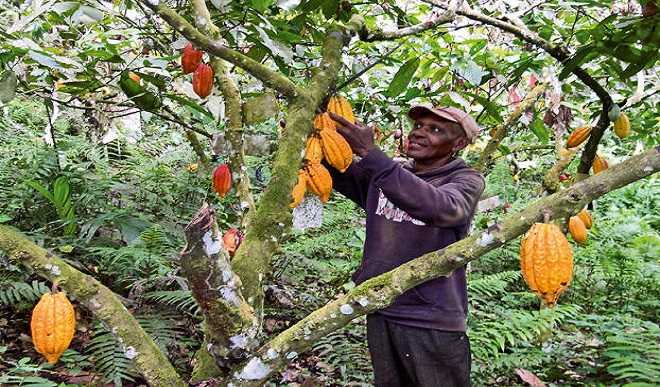
– Expert says it can be grown in Kaduna
This variety later became unique to West Africa, hence the name “West African Amelonado“, for its significant chocolate flavor which remains a benchmark in the World Cocoa Industry till date.
Experts like Dr. Victor Inyama, former President Cocoa Association of Nigeria (CAN), said cocoa can grow in 27 states including Kaduna. The crop can sustain a farmer for the next 70 years. Also, there are available varieties that can start producing after four years.
A tonne of the cocoa beans cost between N800, 000 to N1.2 million depending on the location in Nigeria and the demand is high.
Getting affordable seed/seedlings
Apart from other good varieties, the eight hybrids available in Cocoa Research Institute of Nigeria (CRIN) Ibadan are CRIN TC-1, CRIN TC-2, CRIN TC-3, CRIN TC-4, CRIN TC-5,CRIN TC-6, CRIN TC-7 and CRIN TC-8.
These eight hybrids have diverse genetic base; they are early bearing, high yielding with very low input, resistant to major pests and diseases of cocoa, highly adaptable to cocoa ecologies of Nigeria, very good cocoa quality traits.
Seedling cost
The cost of the seedlings at CRIN are (a) WACRI costs N100 per seedlings, (b) F3 Amazon will cost a farmer N120 per seedling (c) Hybrid-open Pollination is N150 per Seedlings (d) Hybrid-Hand Pollinated N200 per seedling and (e) Budded, N500 per seedling.
Choosing a site for cocoa farm
The Food and Agricultural Organisation (FAO) of the United Nations suggested that if a cocoa tree is to grow well, it needs more than anything else a soil must be of good structure, permeable and deep.
If the soil is of good structure and contains much humus, the roots penetrate well. You can improve the soil structure by spreading manure and working it into the soil. If the soil is deep, the roots can go down to a good depth.
Farmers are advised never to plant cocoa trees in soil with a lot of stones, or in soil where there is some hard layer.
Planting
You can do inter cropping in your cocoa farm, with crops such as plantain, banana, oil palm, coconut and other crops.
In such cases, depending on the inter-crop, a distance of 2.7 to 7 metres should be maintained. The farmer should also consult expert from the research institute on some of the best global practices.
Weeding and soil cover
The FAO noted that many weeds grow among the cocoa tree rows and advised farmers not to let weeds take nourishment away from the cocoa trees.
The UN agency said when the cocoa trees are young, farmers should weed 4 or 5 times every year; and when the cocoa trees are bigger, they cast a lot of shade and so few weeds will grow therefore it will be enough to weed once a year.
Between the rows of cocoa trees, you should not leave the soil bare; cover the soil either with cut weeds or with palm fronds, if available. In this way the soil is protected against sun and erosion; it stays moist and cool and when the weeds rot, they give the soil organic matter.
Pruning cocoa trees
The cocoa tree is a tree that develops well. Sometimes, during the first year, several shoots form on the trunk. Cut off these shoots and leave only the strongest. Sometimes, the crown forms too low down, at less than 1 metre above ground level.
Choose a shoot which grows straight up and let it develop. A new crown will then form at a good height, and the first crown will stop growing.

 Join Daily Trust WhatsApp Community For Quick Access To News and Happenings Around You.
Join Daily Trust WhatsApp Community For Quick Access To News and Happenings Around You.


